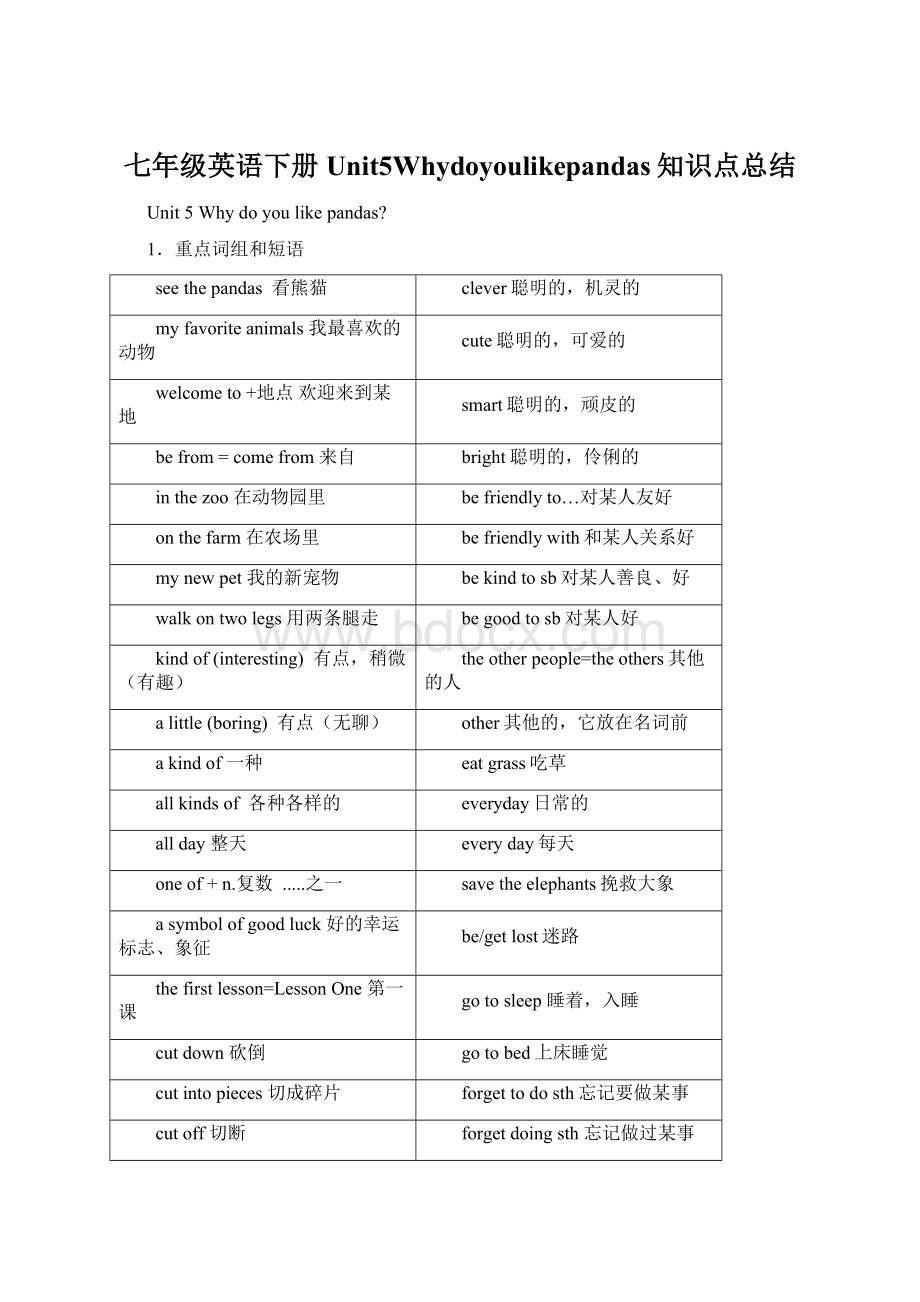七年级英语下册Unit5Whydoyoulikepandas知识点总结.docx
《七年级英语下册Unit5Whydoyoulikepandas知识点总结.docx》由会员分享,可在线阅读,更多相关《七年级英语下册Unit5Whydoyoulikepandas知识点总结.docx(13页珍藏版)》请在冰豆网上搜索。

七年级英语下册Unit5Whydoyoulikepandas知识点总结
Unit5Whydoyoulikepandas?
1.重点词组和短语
seethepandas看熊猫
clever聪明的,机灵的
myfavoriteanimals我最喜欢的动物
cute聪明的,可爱的
welcometo+地点欢迎来到某地
smart聪明的,顽皮的
befrom=comefrom来自
bright聪明的,伶俐的
inthezoo在动物园里
befriendlyto…对某人友好
onthefarm在农场里
befriendlywith和某人关系好
mynewpet我的新宠物
bekindtosb对某人善良、好
walkontwolegs用两条腿走
begoodtosb对某人好
kindof(interesting)有点,稍微(有趣)
theotherpeople=theothers其他的人
alittle(boring)有点(无聊)
other其他的,它放在名词前
akindof一种
eatgrass吃草
allkindsof各种各样的
everyday日常的
allday整天
everyday每天
oneof+n.复数.....之一
savetheelephants挽救大象
asymbolofgoodluck好的幸运标志、象征
be/getlost迷路
thefirstlesson=LessonOne第一课
gotosleep睡着,入睡
cutdown砍倒
gotobed上床睡觉
cutintopieces切成碎片
forgettodosth忘记要做某事
cutoff切断
forgetdoingsth忘记做过某事
bemadeof由...制成的
walkforalongtime走很长时间
placeswithfoodandwater带有食物和水的地方
bein(great)danger在危险中
2.重点知识点讲解
1.kindof表示“有点儿,稍微”,后面接形容词
E.g.I’mkindofhungry(饥饿的).
Koalasarekindofshy.
—Whydoyoulikepandas?
—Becausetheyarekindofinteresting.
▲kind作名词,表示“种类”。
常见短语Whatkindof....?
表示“哪种....?
”
E.g.Whatkindoffooddoyoulike?
【辨析】akindof表示“一种;某种(类)…”
E.g.Whaleisakindofmamal(哺乳动物).
allkindsof“各种各样的…”
E.g.Thereareallkindsofanimalsinthezoo.
manydifferentkindsof“许多不同种类的…”
E.g.Ilikemanydifferentkindsofflower.
▲kind做形容词,意为“善良的、友好的”。
E.g.Hermotherisakindwoman.
常见短语:
bekindtosb.对某人友善;友好=befriendly/goodtosb.
E.g.Youshouldbekind/friendly/goodtoyoursisters.
2.family集合名词,可表示单数也可以表示复数。
①表示“家庭”这一整体做主语时,谓语用单数;
E.g.MyfamilylivesinChengdu.
②表示“家庭成员”做主语时,谓语用复数。
E.g.MywholefamilywenttoBeijinglastsummer.
House:
指居住的建筑物
Home:
指家庭成员所居住的环境或与房屋有关的“家”。
3.allnight:
整夜allmorning:
整个上午alltheyear:
全年
4.save动词,后面直接加名词,表示“救助;节省”
①“挽救,救助”saveone’slife挽救某人的生命savetheelephants挽救大象
E.g.Thetallmansavedthelittleboy’slife.
②“节省,节约”savemoney攒钱savewater节约用水savesth.forsb.为某人节省某物
E.g.Iwanttosavethesecandiesformylittlesister.
Tomsavesmoneytobuyanewstorybook.
5.oneof+名词的复数形式,作主语时谓语用单数
E.g.OneofmyfriendsisgoingtotraveltoNewYork.
【拓展】
Twoof…:
…中的两个Someof…:
…中的一些
Manyof…:
…中的许多Allof…:
…中的全部
6.symbol名词,意为“象征,标记”
常用短语a/thesymbolof...“是...的象征”
E.g.Thedoveisa/thesymbolofthepeace.白鸽是和平的象征。
7.danger是一个名词,意为“危险”
常用短语bein(great)danger表示“处于(巨大的)危险之中”
E.g.Theboyisingreatdanger.那个男孩面临巨大的危险。
8.with是一个介词,表示“和...一起;偕同”
①withsb.意为“与某人一起;和某人”
E.g.ShewatchesTVwithhersister.
Tomlikestoplaythefootballwithhisclassmates.
②with做介词还表示“带有...;有...”,其后面接一个名词构成介词短语修饰前面的名词。
E.g.Thegirlwithlonghairismyclassmate.
Ilikecoffeewithsugar.
11.forget及物动词,后面可以直接加名词,意为“忘记”
①forgetsth./sb.忘记某人/某事
E.g.Sorry,IforgetyourQQunmber.
②forgetdoingsth.忘记已做过某事(已做)
E.g.Iforgettellinghimthestory.
③forgettodosth.忘记要去做某事(还没做)
E.g.Don’tforgettoposttheletterforme.
→反义词:
remember“记得;记住”(用法相同)
12.getlost迷路=loseone’sway
E.g.Theboygotlostwhenhewasintheforest.=Theboylosthiswaywhenhewasintheforest.
13.over
①介词,表示“在...上方;遍及;遍布”
E.g.Thelamp(电灯)isoverthetable.
Thereisabridge(桥)overtheriver.
Wehavefriendsallovertheworld.(allovertheworld遍及全世界)
②副词,表示“结束;从一边到另一边”
E.g.Thefilmisover.
Theplaneflewoverthehill.
14.must用法
▲用在一般疑问句中,肯定回答用must,表示“必须”;否定回答用needn’t,表示“不必”。
E.g.—Musthefinishthehomeworkatonce?
—Yes,hemust./NO,hemustn’t.
▲表示推测时,肯定句用must,表示“一定,想必”;否定句中用can’t,表示“不可能”。
E.g.Herroomislighton.Shemustbeathome.Shecan’tbeout.
3.重点语法
1.Let’sseethepandasfirst.
【解析1】以let’s开头的祈使句,表示邀请,建议;意为“让我们…吧”
let’s是letus缩写,后面接动词原形。
即letsb.dosth.
▶肯定回答用Thatsoundsinteresting/OK./Allright./Yes,let’s…
▶否定回答用Sorry,I……
E.g.—Let’splayvolleyball.
—Allright./Sorry,I’mbusyindoingmyhomework.
【解析2】see在句中是及物动词,意为看见,强调看的结果。
E.g.Canyouseethebird?
【解析3】first副词,表示“首先、最初”
E.g.Iwanttogohomefirst.
Lindadoesherhomeworkfirstafterschooleveryday.
(注:
first也可做序数词,表示“第一”)
E.g.NationalDayisonOctober1st.
2.Whydoyouwanttoseethem?
【解析1】why是特殊疑问词,表示“为什么”,用来引导询问原因的特殊疑问句。
常用because引导的句子来回答,表示直接的原因或理由。
E.g.—Whydoyoulikemusic?
—Becauseit’srelaxed.
【拓展】在英语中用because就不用so,或用so就不用because,即两者不能同时出现。
E.g.BecauseEnglishisveryinteresting,Ilikeit.
It’srainingnow,sowecan’tplayfootballoutside.
BecauseEnglishisveryinteresting,soIlikeit.(×)
【解析2】want动词,表示“想要;想”,后面可以直接接名词
①wantsth.表示“想要某物”
E.g.Iwantabluesweater.
②wanttodosth.表示“想要做某事”
E.g.Shewantstolooktheelephantsfirst.
③wantsb.todosth.表示“想要某人去做某事”
E.g.Myparentswantmetohelpthemtodothedishes.
2.Shesleepsallday,hernameisLazy.
【解析1】sleep做动词,意为“睡觉”,后面可跟副词或介词。
E.g.Ican’tsleepwellbecauseofnoise(噪声)。
【解析2】all形容词,表示“全部的,整个的”
①与单数名词连用时,表示某事在某段时间内持续发生。
E.g.Heplaysalldayandnight.
②与可数名词复数或不可数名词连用时,表示“全部、所有的;一切的”。
此时名词前还可用the,this,that,my,her等修饰;可数名词复数前还可用数词修饰。
E.g.Allherfriendsarehere.
Allthestudentsgohomeafterschool.
3.ButIliketigersalot.
alot固定搭配,副词,表示“非常”=verymuch;用来修饰动词
E.g.Marylikeshamburgersalot/verymuch.(like...alot/verymuch表示“非常喜欢”)
HeknowsalotaboutChina.
【拓展】alotof=lotsof都表示“许多,大量”,都可用来修饰可数名词复数或不可数名词
E.g.Hebroughtalotofnewbooks.=Hebroughtlotsofnewbooks.
Ittakeshimalotofmoneytobuythenewhouse.
=Ittakeshimlotsofmoneytobuythenewhouse.
4.Ilikedogsbecausethey’refriendlyandsmart.
【解析2】friendly形容词,它是由名词friend(朋友)加上ly构成的,表示“友好的”
E.g.Theoldladyisveryfriendly.
常用短语befriendlytosb.表示“对某人友好/友善”
befriendlywithsb.表示“和某人友好相处”
E.g.Sheisveryfriendlytootherpeople.
Theboyissoshythathecan’tbefriendlywithhisclassmates.
5.询问原因和地点
▲原因:
①—Whydoyoulikepandas?
—Becausethey’rekindofinteresting.
②—WhydoesJohnlikekoalas?
—Becausethey’reverycute
③—Whydon’tyouliketigers?
—Becausethey’rereallyscary.
▲地点:
—Wherearelionsfrom?
—They’refromSouthAfrica.
TestforUnit5
1.—I’mverytiredthesedays(这些天)becauseofstudyingforEnglish.
—Whynot____music.Itcanmakeyou_____.
A.listento;relaxB.listento;torelaxC.listeningto;relaxD.listeningto;relaxed
2.Henryisgoodwitheveryoneinourclass.He’salways_____toallofus.
A.friendB.friendsC.friendly
3.—Wehavefivekindsofschoolbags.Doyoulikethisone?
—No,canyoushowme______.
A.anotherB.eachotherC.theotherD.others
4.—Whydoyoulikepandas?
—Becausetheyarevery_____.
A.cuteB.boringC.scaryD.ugly
5.—Whatdoyouthinkofthisbook?
—It’s_____interesting.
A.kindofB.kindsofC.akindofD.akind
6.—WhyisJohnso____toyou?
—Becausehewantsmetohelphim..
A.cleverB.beautifulC.smartD.friendly
7.—Where____thelionsfrom?
—SouthAfrica.
A.mayB.areC.doD.can
8.—Whatdoesthebabyliketodo?
—Shelikes____herparents.
A.toplaywithB.toplaytoC.playwithD.playto
9.—What’swrongwithJim?
—Hecan’tsleep____nightsohecan’tgetup____themorning.
A.in;atB.at;inC.in;inD.at;at
10.—ThisisBill.Isn’thecute?
—_____.Ilikehimverymuch.
A.Yes,heisn’tB.Yes,heisC.No,heisn’tD.No,heis
11.—Thesongsoundsbeautiful.
—_______itisverydifficulttosing.
A.BecauseBSoC.AndD.But
12.—Howmanyelephantsarethereinthezoo?
—Therearen’t______.
A.anyB.someC.oneD.much
13.—____doyoulikemilk?
—Becausethey’reverydelicious.
A.WhatB.HowC.WhyD.Where
14._____thedogsareveryinteresting,____Ilikethemverymuch.
A.Because;soB.So;becauseC.So;/D.Because;/
15.—What_____animalsdoyoulike?
—Ilikedogs,too.
A.otherB.othersC.anotherD.theother
16.—Koalasareverylazy.
—Theyusuallysleepand____20hourseveryday.
A.relaxesB.relaxedC.relaxingD.relax
二.完成句子。
1.A dolphin is very ________ (有趣的)because it can act (表演)as people do.
2. The panda is very shy, so please be very _______(安静).
3.There are many _______(kind) of the animals in the zoo.
4.There are lots of ______(koala) in Australia.
5.She likes ________(play) with her friends.
6.He thinks the giraffes are ________(interest) .
7. Lilei comes from _______(Chinese).
8.What other _______(animal) do you like?
9. Why do you want _______(see) the lions?
10.One of the giraffes _______(be) a baby one.
11.Which animal _______(live) only in China.
12.Let the girl ______(go) to school early.
13.The dolphins come from _______(Japanese).
14.Why do you want ______ (take) a bus to school?
15.This is _______(Helen) book.
16.She likes to play with ________(she) doll.
17.These dolphins are from ________(African).
18.Our teacher is very ________(friend) to us. We like her very much.
19.He usually sleeps and ________ (relax) 20 hours every day.
20.I go to school after _______(have) breakfast.
三.按要求转换句型。
1.Tomdoeshishomeworkeverynight.(变否定句)
Tom___________________hishomeworkeverynight.
2.MollycomesfromAfrica.(对划线部分提问)
_________________Molly_________from?
3.Therearenobooksonthedesk.(变同义句)
Thereare________________booksonthedesk.
4.
5.7、硫酸铜溶液与铁钉的反应属于化学反应。
硫酸铜溶液的颜色是蓝色,将铁钉浸入硫酸铜溶液中,我们发现铁钉变红了。
Ilikeelephants.(对划线部分提问)
______________ofanimalsdoyoulike?
6.Australia,are,cute,from,the,koalas(.)(连词成句)____________________________________
7.Dolphins eat fish. (改为一般疑问句子)
_______________________________________?
8.Helikestigers,too.(同义句)__________________________________.
9.
10.1、月球是地球的卫星,月球围绕着地球运动,运动的方向是逆时针方向。
Whereisyourpenpalfrom?
(同义句)
_________